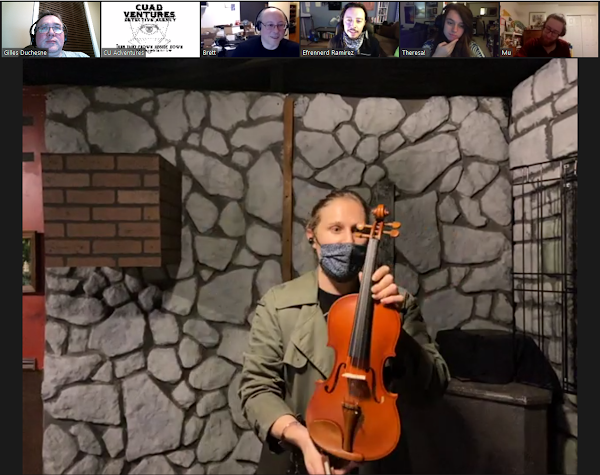Crossing that line (so be it)
Publisher:
Kosmos
Designers:Matthew Dunstan, Phil Walker-Harding, Chihiro Mori
Artists:Martin Hoffmann, Maximilian Schiller, Johanna Rupprecht, Folko Streese
Languages:English, German, Dutch, French & more
# of Players:1-4
Age:12+ (more for some scenarios - I'd recommend 10+ for the tamer ones)
Duration:270 min (broken into ~90 min chapters)
BoardGameGeek Reference:
Wait! Is this even an "Escape Room in a box"?
Fair question. One thing I've noticed in recent years is that the line between what is an "Escape Room", and what isn't, has become increasingly blurry, and that isn't really surprising. Most forms of entertainment go through phases where "standards" are established, followed by a phase in which those standards will be transformed and expanded. Game genres tend to pollinate one another all the time. When talking about the "origin" of Escape Rooms, for instance, you'll see folks saying that it all began in 2004, when Toshimitsu Takagi created a single-room puzzle adventure game in Flash. I've seen others say it began in 1988, when two brothers decided to use HyperCard for something it really wasn't meant to. Personally, I think if you're gonna go that far, you might as well say it all began in 1975, when a divorced computer programmer tried sharing his love of speleology with his daughters. Just another thing we can all "agree to disagree" on.
So anyway, I did not intent to review this series at first, especially since it doesn't even advertise itself as an escape-room-style game. However, I've seen many people regularly bring it up, and the fact it's got the exact same size that those EXIT boxes doesn't help... I ended up changing my mind for this particular game. I still don't expect to publish reviews for this, or this, or this, or this, or this...
Game Design & MechanicsFair question. One thing I've noticed in recent years is that the line between what is an "Escape Room", and what isn't, has become increasingly blurry, and that isn't really surprising. Most forms of entertainment go through phases where "standards" are established, followed by a phase in which those standards will be transformed and expanded. Game genres tend to pollinate one another all the time. When talking about the "origin" of Escape Rooms, for instance, you'll see folks saying that it all began in 2004, when Toshimitsu Takagi created a single-room puzzle adventure game in Flash. I've seen others say it began in 1988, when two brothers decided to use HyperCard for something it really wasn't meant to. Personally, I think if you're gonna go that far, you might as well say it all began in 1975, when a divorced computer programmer tried sharing his love of speleology with his daughters. Just another thing we can all "agree to disagree" on.
So anyway, I did not intent to review this series at first, especially since it doesn't even advertise itself as an escape-room-style game. However, I've seen many people regularly bring it up, and the fact it's got the exact same size that those EXIT boxes doesn't help... I ended up changing my mind for this particular game. I still don't expect to publish reviews for this, or this, or this, or this, or this...
 |
| Sample game components |
- The game is primarily made of two decks of cards that (as always) you only reveal whenever you're asked to.
- Location cards (they have different names in each game, but the idea's the same) are oversized cards identified by a single letter. As you explore the game setting, you'll be allowed to pick and place an increasing number of them on the table. Some cards might also end up replacing others, as things change in the game world.
- Adventure cards are regular-sized, and typically bear a single number (although each game has special cards with other codes). Those cards can have all sorts of effects and instructions, but for the most part they'll show you an item you can now use.
- The game will typically ask you to perform one of these 3 things: "Take card X from the deck" (if it's not there, just keep going), "Put card X back in the deck", and "Put card X back in the box" (meaning it's out of the game for good, whether it was still in the deck beforehand or not).
- Before the game starts proper, each player will have to pick a character from the 4 offered. (If you're playing solo, you'll be asked to pick 2 and play for both.) Although they don't have any special stats per se, you'll find that they'll respond differently to some of the game events.
- The final game component is the Adventure Book, a whole bunch of numbered paragraphs. I'll explain how this works below. There are also textual descriptions of every Location card. You must read those out loud the first time you enter a location, and can check them again whenever you like.
- When it's your turn, you'll be allowed to 1) trade item cards with other characters in the same spot, 2) move to a different location, 3) perform one action at that location, and 4) trade items once again.
- The most basic action is to explore a specific area within a location. Those cards bear a bunch of 3-digit numbers, so your character can investigate every nook & cranny by reading the corresponding paragraph out loud.
- Inventory objects can be combined one with another, by merging their two 2-digit numbers into a 4-digit one, and checking if a corresponding entry exists in the Adventure book.
- Likewise, you can try to "use" any object in a location by merging the card's number with any of the 3-digit code, and look for a matching 5-digit entry in the Adventure book.
- The Adventure Book can even be used to validate the occasional puzzle, as long as its answer is made of numbers.
- Every game will have its own extra rules. For instance, "The Dungeon" has a "wounds" system, while "Monochrome Inc." has an "alarm level".
- While each game can - of course - be played in one sitting, it's broken down into 3 chapters, making it easier to pause in-between. The game box even includes baggies you can use for storage.
- The Kosmos app, available for iOS and Android, lets you enter paragraph numbers to have them read to you.
- At the end of every chapter, you'll be awarding yourself points by following the game's instructions.
- If stuck, there are some hints at the end of the rulebook. You can look up locations or card numbers in them.

|
| Rulebook example. By looking up entry 1015 in the Adventure Book, you'd be told to put card 10 in the box, then take card 12 from the deck. |
Pros
- The "paragraph book" mechanic works pretty well. I wish more games had it.
- The way different characters will react differently to one-time events means that not every playthrough's the same.
- There are multiple ways to solve some of the obstacles you'll encounter along the way.
- Story-wise, the game plots have several interesting twists and turns.
Cons
- Well, like I said at the very top, I wouldn't consider these to be Escape-Room-in-a-Box in the first place. Aside from the absence of time limit, the puzzles are majorly "inventory-based", like, well, computer adventure games (duh), and don't feel very escape-room-ish.
- I'm not quite how to phrase this, but the game mechanics seem to be... counter-effective somewhat. I mean that this is game that should inherently be about searching every nook & cranny, but doing that will likely get you into trouble. This paradox seemed even more obvious in "Monochrome Inc.", where the difference between a smart move and a dumb one can really be subtle. 🤨
- Depending on the order in which your perform some actions, the 3 chapters might not be of even length. I've had a 150-min one followed by a 45-min one.
- The hints, too, are somewhat uneven. You can be told "combine this card with number X", but whether or not you'll be told how to obtain that second card seems a toss-up.
House Rules & Suggestions
To get the best gameplay experience, I suggest you do the following:
- No turns
Unless a special rule is currently in effect (you know, something like: "lose a life after every turn you play until..."), I wouldn't bother about having every single character play in sequence. Just pretend everyone else is "passing". - 3 characters minimum
Having more characters allow you to make strategic decisions regarding who handles what. The game suggests picking 2 characters if you're playing alone, but I suggest picking 3. Likewise, you could add 1 or 2 characters to a 2-player game, which brings me to the next suggestion... - Assignments optional
Unless your group of players really cares for sticking to one character each, you could even go one step further, by having the players go in turn, but have them pick any character they want to use during their turn. Leave those characters in front of their respective "owners", but let others borrow them on their turn. - Score-affecting hints
If getting "free hints" seems wrong to you, just subtract 1 point from your final score for every "useful" pointer you got from the Hints section.
Currently Out (underline bold titles are those I've played)
- The Dungeon (played with 4)
- Monochrome Inc. (played alone)
- The Volcanic Island





















